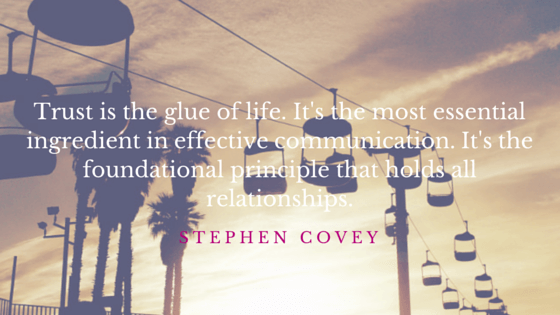Peter Drucker famously said : “Culture eats strategy for breakfast”, though I prefer the way Nilofer Merchant put it in this HBR article a few years ago:
“Culture Trumps Strategy, Every Time”
A core element of Culture is Trust, how we behave around each other, how far we will go for each other, yet in our increasingly online world we seem to spend more and more time sacrificing building real relationships and instead focussing on shallow ratings, so sacrificing trust for ratings.
I’ve just watched an episode of the Netflix series Black Mirror, called Nosedive (and thanks to Glen Trenouth for the recommendation). Released in October 2016, this episode talks about a world only a little exaggerated from our own where we constantly rate all interactions with each other, almost always with ?????, as if every interaction is a) meaningful, and b) warrants a maximum five stars.
In this futuristic (hmm ?) episode, access to everything, every service, job, airline ticket etc is based on your rating out of ?????.
Far fetched? No, real life, am coming to you soon, or even already here.
Rachel Botsman (posts on this site noting her here), a brilliant thought leader and absolutely in my current top ten of thinkers I follow, wrote a book in 2017 called “Who Can You Trust?“, in which she combines thought leadership and wonderful story telling to really have us think about the evolution of Trust and where we are with it now in society.
One core and quite chilling element right out of the Black Mirror episode is Rachel’s chapter and analysis in her book on the Social Credit System due for launch by 2020. She excerpted this for Wired in October 2017 “Big data meets Big Brother as China moves to rate its citizens” and closed that piece with:
“Today China, tomorrow a place near you. The real questions about the future of trust are not technological or economic; they are ethical. If we are not vigilant, distributed trust could become networked shame. Life will become an endless popularity contest, with us all vying for the highest rating that only a few can attain.”
This is here now. Here in London, Uber passengers can see their own rating, as given by drivers. Article after article is written about how to lift your rating (including “tip in cash, not via the app”), and I can attest that I did for a while feel I should always make the effort to go back into the app and rate the driver, and always give five stars in the hope somehow they’d do the same and lift my rating. Sad, huh ? Easy to fall into that trap though, as I did for a while. Harmless, just give them ????? !
So, to my own twist on “Culture Trumps Strategy, Every Time” in the title of this article :
“Trust Trumps Ratings, Every Time”
Yes, we live in a blended online and offline world, I get that. However, please (please!) remember to focus first and foremost on real, human, face to face interactions. Trust is built with other human beings through presence, listening, caring, respect, love, giving, receiving, helping, appreciating, acknowledging.
When I’ve had challenges in my own life, it has always been those people who I’ve build connections and trust with through real life who have been there for me, and likewise in reverse.
Social media and the online life can be valuable to stay connected with people at some level, but I implore you, live a real life. Real relationships with people, face to face, wholehearted, good and bad, not just shiny and smiley Instagram posts.
Be real, live a real life, build real relationships.
Trust comes from real relationships at all levels, work, friends, family, love. Trust comes from being fully present for others, not just clicking and rating on a social media post.
Trust is the most important asset we have as people, as businesses, tribes, organisations, movements.
Ratings are shallow. Be deep. Build Trust.
As I often find, Master Stephen Covey has wonderful words to close with.

